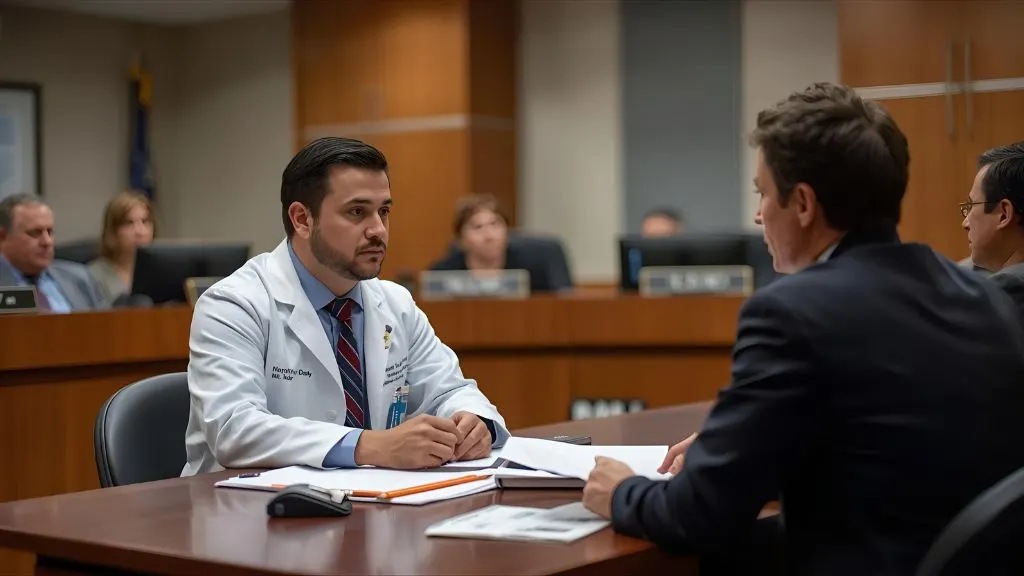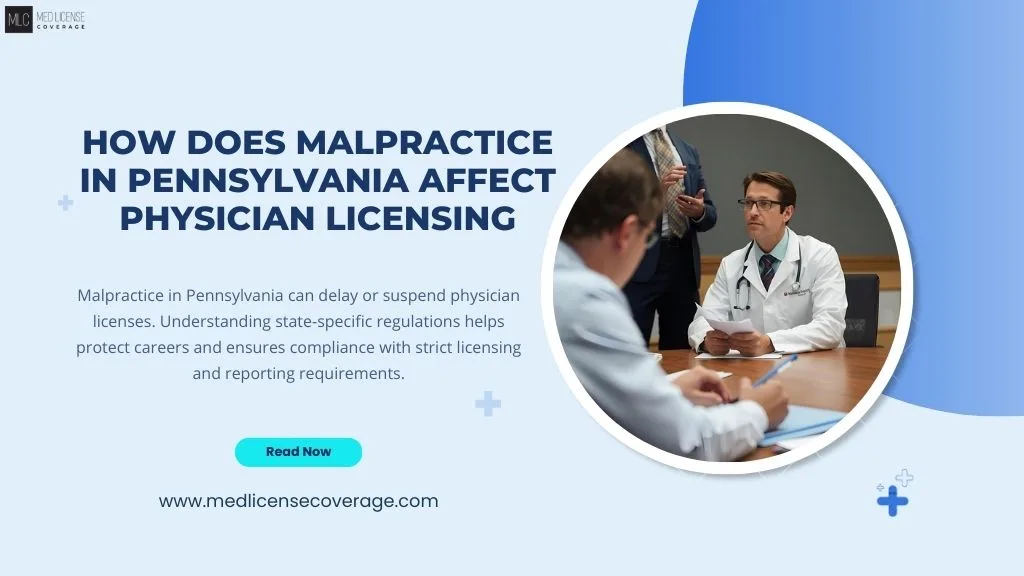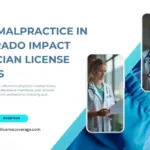Malpractice in Pennsylvania influences medical Physician licensing significantly. State-specific oversight governs how misconduct impacts licensing. Each malpractice event brings scrutiny from regulatory bodies. Proper resolution is important for maintaining compliance and professional balance.
Pennsylvania’s Regulatory Environment for Malpractice
The Pennsylvania State Board of Medicine regulates health practitioner behavior. All lawsuits undergo a formal evaluation. Verified claims initiate disciplinary action. Oversight includes hearings, investigations, and documentation reviews. Licensing is paused or denied if risks are unresolved.
Disclosure Rules in Pennsylvania Licensing
Every malpractice incident must be disclosed in the licensing process. This consists of proceedings, settlements, and judgments. Any omission results in delays. Pennsylvania licensing forums are active; review countrywide databases and malpractice insurers before making licensing decisions.
Role of Malpractice History in License Evaluation
The severity and pattern of malpractice determine the board’s choice. Isolated occasions may not affect licensing. Repeated or excessive threat claims lead to denials or conditional approvals. Boards investigate the doctor’s risk profile thoroughly.
Mandatory Reporting Obligations
Malpractice incidents have to be reported to the national board. Hospitals, insurers, and healthcare institutions are legally required to file settlements. Failure to file violates the state’s regulations and invites disciplinary action, such as license suspension.

The Impact of Ongoing Investigations
Active malpractice investigations delay licensing. Boards wait for the very last judgments before issuing or renewing licenses. Physicians with unresolved claims face additional screening and can be located under review.
Settlements and Their Licensing Consequences
Settling a case does not remove licensing issues. Pennsylvania evaluates every agreement’s context and value. High-price payouts endorse negligence and lift red flags. Such instances slow down license processing or lead to provisional approvals.
Hospital Credentialing and State Licensing
Credentialing and licensing are interconnected. Malpractice cases affect both strategies. Hospitals review the identical malpractice history before granting privileges. Any denial of a medical institution’s degree regularly triggers a board investigation.
Physician License Reinstatement After Malpractice
License suspension because of malpractice isn’t usually everlasting. Reinstatement calls for evidence of remediation. Pennsylvania mandates corrective applications, monitoring, and ethics education. Documentation has to display behavioral reform and adherence to clinical standards.
Disciplinary Actions through Specialty
Malpractice affects high-risk specialties in unique ways. Surgeons, anesthesiologists, and OB-GYNs face deeper opinions. Boards account for areas of expertise-specific dangers for the duration of the evaluations. The frequency of incidents impacts whether a license remains active or is revoked.
Credential Verification During Licensing
The licensing method consists of deep credential reviews. Education, employment, and malpractice records are proven. Inaccuracies or omissions gradually lead to disapproval. Boards seek advice from more than one resource before granting or reinstating a license.
Transparency Through Public Access Records
Pennsylvania continues to maintain public databases for malpractice claims. Patients and employers get access to this information earlier than when seeking care or providing jobs. Public visibility will increase the duty and provide stress for obvious licensing practices.
Multi-State Licensing and Malpractice Disclosure
Physicians making use of it in a couple of states have to expose malpractice claims universally. All the states involved reviewed Pennsylvania records. Inconsistent facts result in software rejections or long delays in approvals.
Legal Involvement in Malpractice Defense
Legal representation performs a crucial function. Attorneys ensure that all documentation is accurate and that clients’ rights are protected. Licensing boards regularly reply to prison arguments. Legal oversight helps ensure timely and honest choices from regulatory agencies.
Role of Physician Licensing Services
Physician licensing offerings assist in the course of malpractice-associated troubles. Services include paperwork, verification, attraction training, and file tracking. These professionals assist in keeping away from delays and reinforcing license applications.
Link Between Malpractice and CME Requirements
Continuing Medical Education (CME) is essential after malpractice. Pennsylvania mandates CME as part of rehabilitation. Boards review the completion records of the course before reinstating licenses. CME proves ongoing dedication to expert development.
Recovering from Malpractice Allegations
Recovery consists of:
- Completing ethics programs
- Obtaining strong reference letters
- Participating in peer reviews
- Submitting remediation reviews
- Each attempt demonstrates an increase and supports licensing reconsideration.
Hospital Reporting and Board Follow-Up
Hospitals document revoked clinical privileges due to malpractice by the state board. Such reviews often cause full board reviews. Suspension of scientific privileges can cause license evaluation even without a formal court case.
Influence of Malpractice by State
Malpractice by State differs. Pennsylvania’s rules mirror nearby priorities. Each state board handles equal opportunity differently. Comparing policies throughout states allows for the expectation of licensing effects and guides multi-country applications.
Importance of Accurate Medical Documentation
Accurate documentation protects in opposition to malpractice claims. Incomplete or inconsistent information increases liability and harms licensing efforts. Pennsylvania board emphasizes precision while reviewing patient records or treatment information.
Ethics in Medical Practice
Ethical conduct foundation is the idea for license approval. Violations related to privacy, consent, or reporting create fundamental hurdles. Pennsylvania evaluates ethics closely at some stage in license programs and renewals.
Administrative Penalties for Non-Compliance
Ignoring board policies results in administrative fines and warnings. Repeated violations cause deeper inquiries. Pennsylvania tracks all compliance facts to decide on destiny packages and renewals.
Role of technology in Application Management
Modern licensing is based on virtual structures. Physicians use portals to upload malpractice reports and credentials. Errors in submission lead to rejection or delays. Technology helps maintain transparency in each phase.
Strengthening Application Success After Malpractice
Success after malpractice calls for:
- Full disclosure of past claims
- Engagement with licensing services
- Submitting entire, up-to-date documents
- Showing an professional growth
- These actions improve the chances of license recovery.
Conclusion
Malpractice in Pennsylvania impacts Physician licensing through strict oversight, disclosure needs, and public accountability. Each incident undergoes a complete board assessment. Delays, suspensions, or denials often result from unresolved or hidden claims.
Physician licensing services offer vital assistance. They reduce danger, manage appeals, and ensure timely, correct filings. Compliance with Pennsylvania’s rules and moral standards improves long-term licensing effects.
FAQs
1. How does malpractice in Pennsylvania affect physician licensing?
Malpractice in Pennsylvania triggers investigations by the Pennsylvania State Board of Medicine. Verified claims can bring about delays, suspensions, or revocations of licenses based on their severity, repetition, and effect on the affected person or public belief.
2. Are malpractice settlements pronounced at some point of licensing in Pennsylvania?
Yes. All malpractice settlements, irrespective of fault admission, should be disclosed. Pennsylvania forums evaluate the declaration’s context, financial value, and frequency while determining the effect on physician licensing or credentialing reputation.
3. Can a physician regain a license after malpractice in Pennsylvania?
Yes. Reinstatement is viable after demonstrating remediation, finishing ethics packages, and complying with board requirements. Evidence of expert improvement and adherence to requirements allows for the restoration of licensing after a malpractice-related suspension.
4. Do malpractice instances postpone license renewal in Pennsylvania?
Yes. Active malpractice investigations or the latest settlements can delay license renewal. Pennsylvania boards consistently hold off on making renewal decisions until they have reviewed, documented, and appropriately addressed all case details in the physician’s application.
5. What is the role of physician licensing services in malpractice instances?
Physician licensing offerings assist with documentation, credential verification, appeal support, and compliance control. These services help physicians navigate licensing delays, particularly in malpractice-associated opinions through the Pennsylvania scientific board.
6. How do malpractice risks vary by forte in Pennsylvania?
Specialties like surgical procedures, emergency medication, and obstetrics face higher malpractice scrutiny. Pennsylvania forums take into account these risks and evaluate claims more fastidiously, affecting licensing consequences and credentialing selections within high-risk disciplines.







